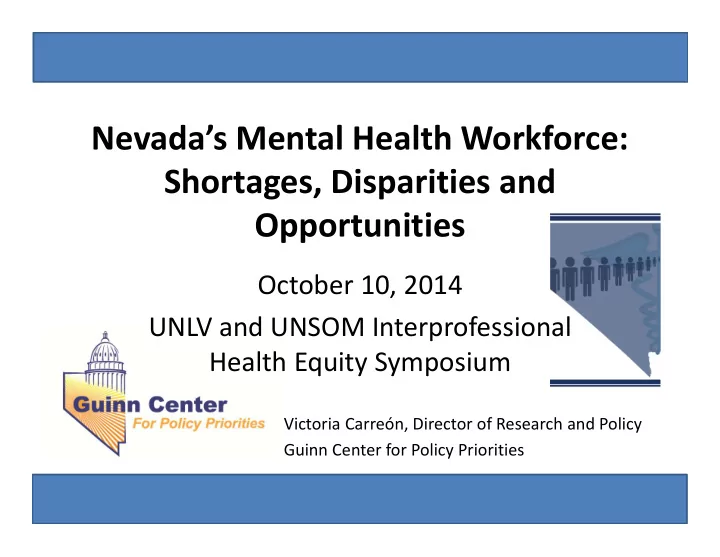

Nevada’s Mental Health Workforce: Shortages, Disparities and Opportunities October 10, 2014 UNLV and UNSOM Interprofessional Health Equity Symposium Victoria Carreón, Director of Research and Policy Guinn Center for Policy Priorities
Key Research Questions How do racial and ethnic disparities interact with shortages in services? Short Term: How can licensing be improved? Short Term: How can pay be improved? Long Term: How can we create a workforce development system?
Significant Shortages in Mental Health Services in Nevada Mental Health Professional Shortage Areas in Clark County Source: UNSOM, Health Workforce in Nevada 2013 Shortage Edition Area Source: HRSA
“Severe Mental Illness” Affects All Races/Ethnicities Source: National Survey on Drug Use and Health: 2 ‐ Year R ‐ DAS (2008 to 2009, and 2010 to 2011)
And Nevada’s Population is Becoming Increasingly Diverse Nevada Population 2013 Other 3% African Asian American 8% 9% White 52% Latino 28% Source: U.S. Census State and County Quick Facts
Service Penetration Rate Low ‐ Especially for Latinos SAHMSA, CMHS Uniform Reporting System Output Tables
Most Nevada Mental Health Professionals are White Source: EEO 1r. Detailed Census Occupation by Sex and Race/Ethnicity for Residence Geography, Universe: Civilian labor force 16 years and over more information EEO Tabulation 2006 ‐ 2010 (5 ‐ year ACS data)
But Diversity is Increasing Among Nevada Graduates Source: Integrated Postsecondary Education Data System (IPEDS)
Psychiatry still has a long way to go Source: AAMC, Diversity in Medical Education: Facts and Figures 2012 & AAMC, Physician Workforce Facts and Figures 2010
Seven Licensing Boards for Mental Health Professions • Medical Examiners • Osteopathic Medicine • Psychological Examiners • Nursing • Examiners for Social Workers • Examiners for Marriage and Family Therapists and Clinical Professional Counselors • Examiners for Alcohol, Drug and Gambling Counselors
Is it Easy to Come to Nevada from Another State? • All boards have provisions to endorse or license people from other states • Barriers – Years of experience requirements – Exam requirements – Differences in training requirements between states – Fingerprinting policies – Review time period
Licensing Solutions Needed at National Level • Development of interstate compacts to facilitate mutual recognition and telehealth – Nurse Licensure Compact – Advance Practice Registered Nursing Compact – Psychology Agreement of Reciprocity – Interstate Medical Licensure Compact – Interjurisdictional Telepsychology Compact
Nevada Licensing Recommendations • Simplify exam and years of practice requirements • Accept training hour standards in other states • Create uniform procedures for fingerprints • Create uniform standard to provide provisional or temporary license until meet all requirements • Create Uniform timelines • Continue to collaborate on national compact agreements in medicine, nursing, and psychology
State has High Mental Health Staff Vacancies Position Vacancies: Percent Vacancies: Percent Low End High End of DHHS Vacant Department Vacant of Salary Salary DHHS of Corrections Corrections Range Range Clinical Program Manager 2.0 9% $54,204 $102,228 Clinical Social Worker 3.5 6% $45,560 $81,139 Licensed Psychologist 2.0 7% $67,692 $107,114 Mental Health Counselor 5.0 10% $45,560 $97,593 Mental Health Technician 9.5 5% $27,895 $40,110 Psychiatric Caseworker 2.0 3% $38,523 $61,950 Psychiatric Nurse 40.2 15% 3.0 11% $49,694 $97,593 Senior Psychiatrist 32.0 76% 1.6 29% $155,621 $176,902 Substance Abuse Counselor 1.0 22% $38,523 $67,692 TOTAL 97.2 14% 4.6 14%
Increased State Reliance on Contractors • Department of Corrections – $544,581 spent on contract Senior Psychiatrists in 2013 ‐ 14 • Department of Health and Human Services – Data not available on total spent on contracts – $6.1 million allocated in last year for new contract positions or transfers from salaries to professional services
Is Nevada pay competitive in the region? • Intermountain West: Arizona, California, Colorado, Nevada, New Mexico, Texas, Utah • Impact of recession • Nevada most competitive – Nurses and social workers • Nevada least competitive – Psychiatrists and psychologists • Explore increasing state salaries
Nevada Ranks 5 th in Pay for Psychiatrists Source: Bureau of Labor Statistics, Occupational Employment Statistics (OES) Survey
Nevada Ranks 4 th in Pay for Psychologists Source: Bureau of Labor Statistics, Occupational Employment Statistics (OES) Survey
Nevada Ranks 2 nd in Pay for Registered Nurses Source: Bureau of Labor Statistics, Occupational Employment Statistics (OES) Survey
Nevada Tied with CA for Top Pay for Social Workers Source: Bureau of Labor Statistics, Occupational Employment Statistics (OES) Survey
Long ‐ Term: Create Statewide Plan • Consolidate current planning efforts – Health Care and Medical Services Industry Sector Council – Department of Health and Human Services • Pass statutes to require data collection – Nursing board already collecting data • Require evaluation of plan – California example
Long Term: Strategies • Engage – More STEM emphasis for under ‐ represented groups in K ‐ 12 • Train – Increase access to training in NV • Recruit – Create more scholarships that require service in Nevada such as New Mexico BA ‐ MD Program – More money dedicated to loans • Retain – Competitive salaries – Work environment
Questions? About the Kenny C. Guinn Center for Policy Priorities The Kenny C. Guinn Center for Policy Priorities (Guinn Center) is a 501(c)(3) nonprofit, bipartisan, think ‐ do tank focused on independent, fact ‐ based, relevant, and well ‐ reasoned analysis of critical policy issues facing the state of Nevada. The Guinn Center engages policy ‐ makers, experts, and the public with innovative, fact ‐ based research, ideas, and analysis to advance policy solutions, inform the public debate, and expand public engagement. Contact Information Contacts Kenny C. Guinn Center for Policy Priorities Nancy E. Brune, Ph.D. c/o InNEVation Center Executive Director 6795 Edmond Street, Suite 300/Box 10 nbrune@guinncenter.org Las Vegas, NV 89118 Victoria Carreón Phone: (702) 522 ‐ 2178 Director of Research & Policy www.guinncenter.org vcarreon@guinncenter.org
Recommend
More recommend